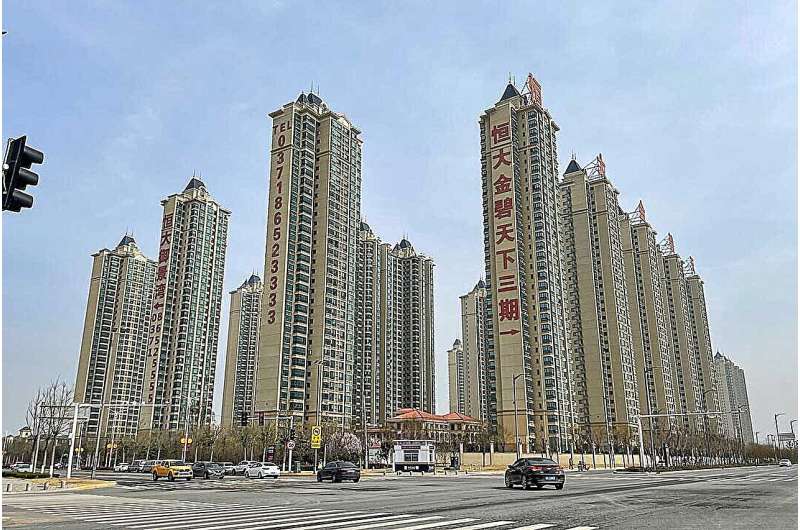This article has been reviewed according to Science X's editorial process and policies. Editors have highlighted the following attributes while ensuring the content's credibility:
fact-checked
trusted source
proofread
Research reveals overlooked factor driving China's real estate crisis

The default of Evergrande, one of China's largest developers, set off a chain of defaults among developers, triggering the ongoing property market crisis in China.
While analysts frequently attribute the crisis to China's tax system, land finance, state intervention, and various other factors, recent University of Michigan research has revealed an often overlooked aspect–the concentrated nature of the real estate industry.
The research, led by Lan Deng, professor of urban and regional planning, examined China's real estate industry from the early 2000s to 2018. It found that the industry became increasingly concentrated, with large firms accounting for a growing share of the country's housing production, which played a significant role in the market's downturn.
For instance, the top five real estate developers in China accounted for 30% of the country's total housing production in 2018, compared to a share of 13% in the U.S. Housing production in the U.S. was only about a quarter of what China has produced in the last decade.
The China Real Estate Top 10 Research Group further highlights this concentration–among 10,000 registered real estate development firms in the country, the market share of the top 100 firms, as measured by sales revenue, increased from 28% in 2012 to 58% in 2018.
The repercussions of such conglomerates failing are wide-ranging, as demonstrated by Evergrande and Country Garden, the top two property developers in China. Evergrande, once boasting an annual construction of 72 million square meters, filed for bankruptcy protection in August 2023.
Country Garden, whose annual housing production was about twice the size of Evergrande before the pandemic, defaulted in October 2023 and faced a liquidation petition from its creditor the following year, according to the latest news reports. The collapse of these industry leaders has placed a drag on the entire Chinese property market.
The concentration of the real estate sector in China was mostly due to the advantages large developers enjoy, according to the study. Large developers often had access to low-cost capital. In China, all major banks are state-owned and banks' ability to lend is thus heavily regulated by the state.
Concerned about the country's economic overdependence on the real estate industry, the state-mandated only developers assessed as low risk could obtain bank loans–these were typically large developers with direct or indirect ties to the state.
Another factor that contributed to the concentration was China's presale model in the property market. Under the presale model, buyers' down payment, as well as their mortgage loans, are transferred to developers during the development process, which are then used as development capital. Because of the risks associated with presales, homebuyers in China would prefer purchasing housing from large firms with established records.
China's open land market system also favored large developers. In China, land is owned by the state and is sold to the highest bidder via an auction process. As a result, only developers with sufficient financial resources can win the bid–usually, they are large developers. Since 2006, the Chinese central government has imposed a land quota system that limits the amount of land local governments can supply for urban development.
As a result, from 2004 to 2018, the annual increase in land cost averaged about 17%, while the average annual increase in housing price was about 9%. That land cost has risen at a much faster pace than housing prices indicates a declining profit margin for real estate development over time, making it difficult for small developers.
"The concentration of the real estate industry not only exacerbates challenges for the national economy but also brings negative impacts to local economies," Deng said.
The real estate sector contributed around 20% of China's GDP. Large developers often expanded nationally, looking for new development opportunities outside their home cities, especially in regions with lower land costs, leading to housing oversupply in those places.
For instance, China's top 30 real estate development firms were building across an average of 80 cities in 2017, compared to an average of only five cities in 2003. Evergrande has grown from building in 25 cities in 2009 to building in 228 cities in 2018.
As firms expanded across cities, real estate development was less of a local business, as profits earned through local residents' home purchases were often sent back to those firms' headquarters, which are usually located in more prosperous regions, contributing to the rising regional disparities, the study found.
Furthermore, when local markets turn in a negative direction, those large national firms could quickly withdraw their investment from less-developed places, as seen during the COVID-19 pandemic. This exposes local economies, often reliant on real estate as a growth engine, to dire consequences with little development activity, according to the study.
The study is published in the journal Housing Studies.
More information: Lan Deng et al, Housing production and the structural transformation of China's real estate development industry, Housing Studies (2024). DOI: 10.1080/02673037.2024.2334797
Provided by University of Michigan





















